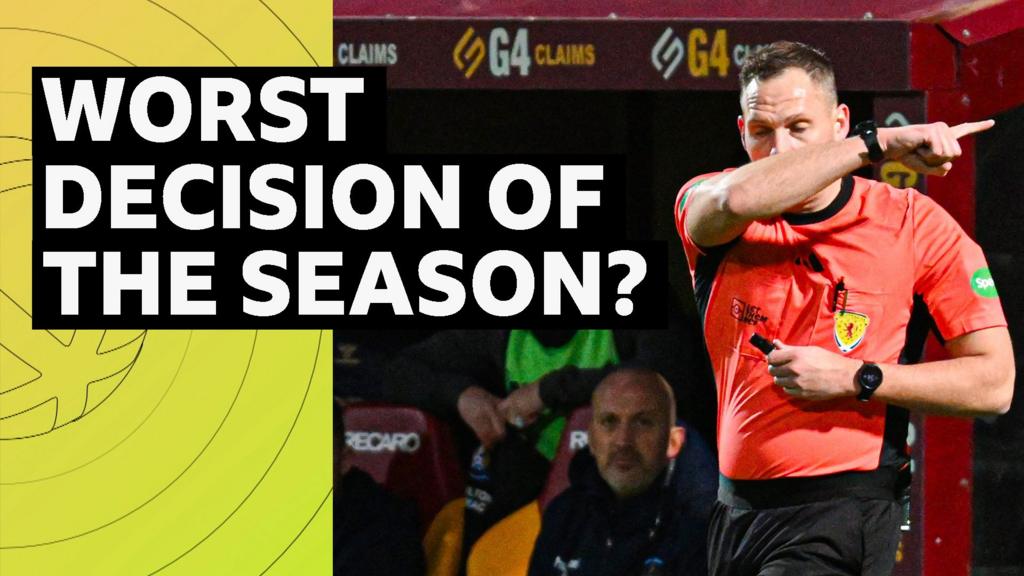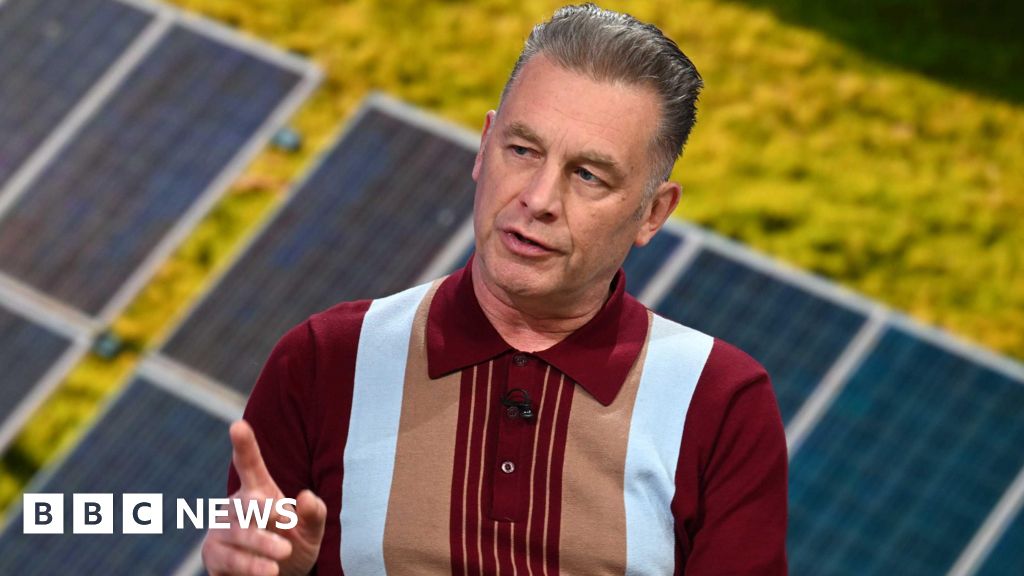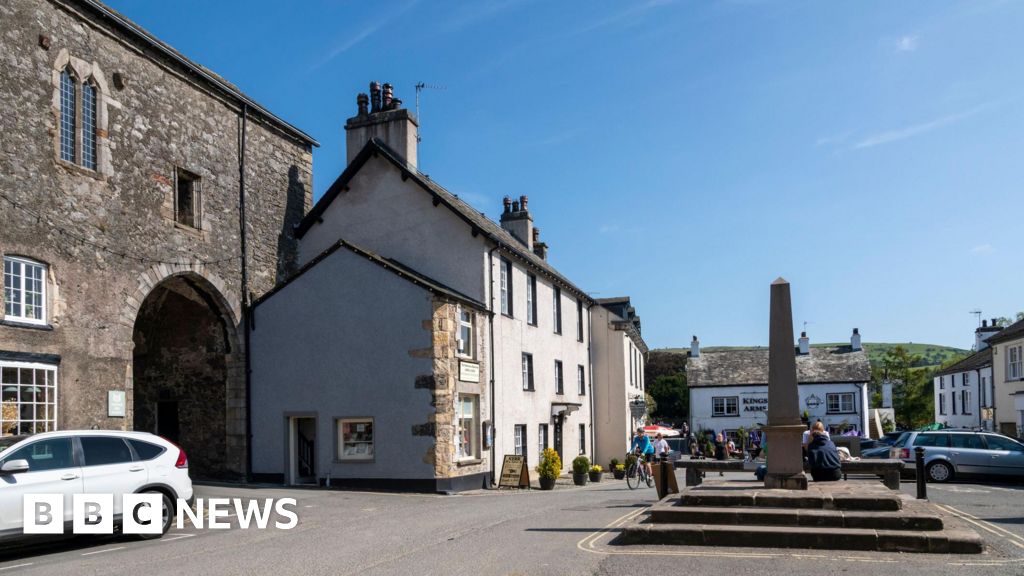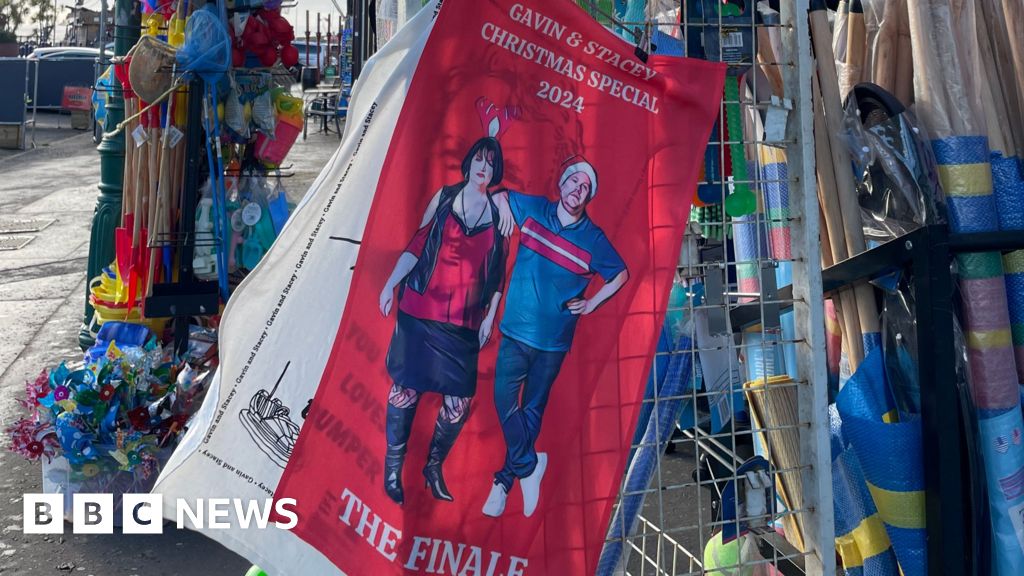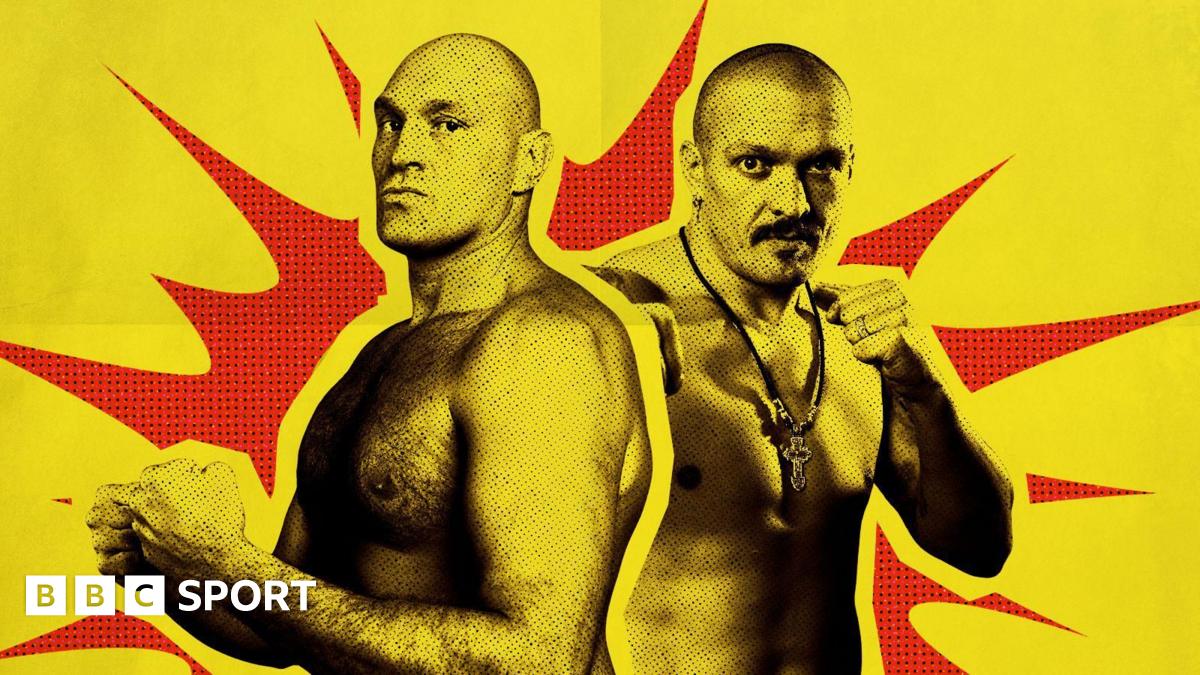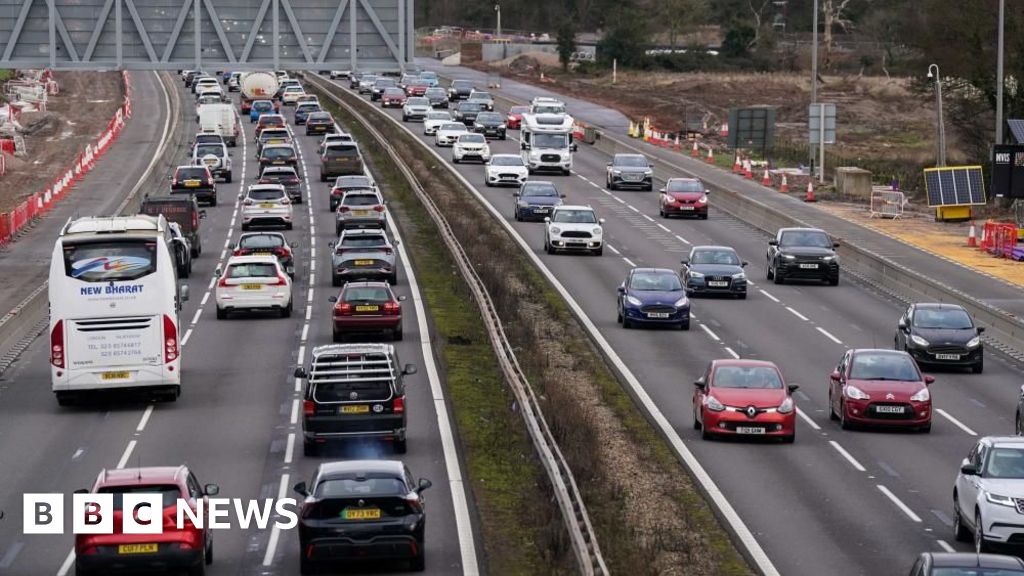
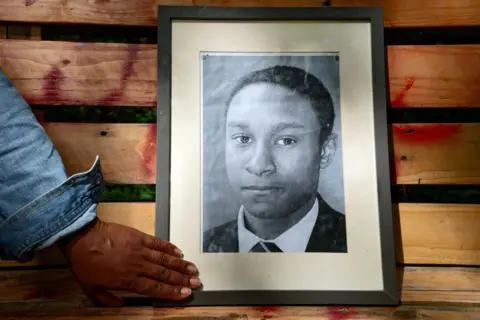 BBC/Laurence Cawley
BBC/Laurence Cawley
Jovanni Peddie fell to his death from a tower block in 2011 and his mother is calling for action on high-rise safety
Luanda Peddie remembers the day her world shattered.
In 2011, her 14-year-old son Jovanni fell to his death from the sixth floor of their family home in the Missenden block of London's Aylesbury Estate.
"It's a place of horror, it's a place of hell, it's a place of trauma," health worker Luanda says, describing the devastating image she's struggled to erase from her mind.
Now she is calling on councils and landlords to take action, as they are "failing innocent children whose lives are at risk every single day".
Her voice breaks as she recalls the moment she realised something was wrong.
"I went into his bedroom," she says, "and I was like, 'Oh, where's Jovanni?' And then I asked his dad, who was in the bathroom at the time, 'Where's Jovanni?' But I noticed that the window was wide open.
"I then went over to the window, and, yeah, I saw him, you know, at the bottom of the window, I couldn't believe it, and that's when just all hell broke loose. Really, was just panic. It was hysteria. I just couldn't believe what I was seeing," Luanda recalls, her voice trembling with emotion.
Jovanni was a bright, intelligent boy who dreamed of becoming an architect.
His mother's decision to speak about the tragedy for the first time to the BBC, comes in the wake of two recent incidents in London. She has asked for her face not to be shown to protect her family's privacy.
Jovanni was found lying on a second-floor balcony beneath.
Medics arrived quickly but he died soon after in hospital.
The post-mortem examination revealed Jovanni died from multiple injuries caused by the fall.

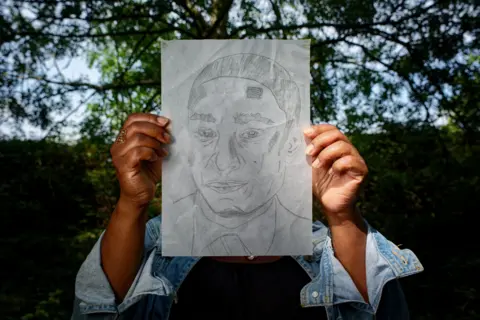 BBC/Laurence Cawley
BBC/Laurence Cawley
Luanda says her son dreamed of becoming an architect
"To hear that it's still happening to this day is just appalling and it's devastating," Luanda said.
"It's heartbreaking to think that lessons haven't been learned by local authorities, and more families are experiencing the same nightmare we went through."
On 16 May, five-year-old Aalim Ahmed fell from his 15th-storey kitchen window in Plaistow, east London and on 24 May, 12-year-old Renoy Ellis died after falling from an upper floor of a flat in Kennington, south-east London - two tragedies in the space of a few days in the capital.
"Each new incident feels like a punch to the gut. It's not just sadness anymore - it's a mixture of grief, anger, and frustration," she adds.
"I feel compelled to speak out, to fight for change, because I can't bear the thought of another family going through what we did."
Scores of young people have died in tower falls

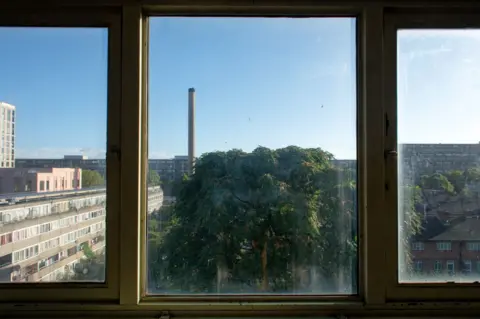 BBC/Laurence Cawley
BBC/Laurence Cawley
Since 2013, 66 people under 19 have died from falls in high-rises across England and Wales
According to the ONS data, 66 people aged 19 or under, like Jovanni, died after falling from buildings across England and Wales between 2013 and 2022 - the most recent data available.
Of those, 24 were in London alone.
Despite regeneration projects, newer building regulations and construction methods, the total number of deaths per year in England and Wales, and within London have remained consistent during this period.
The Royal Society for the Prevention of Accidents (RoSPA) said London has a very large number of high rises thereby increasing the people falling from a height.
It has also said some of the older buildings "do not comply with current standards and regulations around safety" and called on this issue to be dealt with as a priority.
In an attempt to find some more detail behind the statistics, the BBC London investigation team analysed local papers dating back to 2010 and found at least 20 cases where young people died after falling from high rise social housing in London.
Examples include:
- In October 2019, an 18-month-old fell over 100ft (30 metres) from a tower block in Tottenham, despite complaints about faulty latches
- A three-year-old boy died on his birthday after falling from the fourth floor of his building in Harrow in November 2019
- In June 2016, a severely autistic seven-year-old girl fell from the 11th floor of her tower block in Clerkenwell
- Also in 2016, a teenage boy and girl died after falling from a tower block in Deptford, east London during a party.
Problems persist on troubled estate

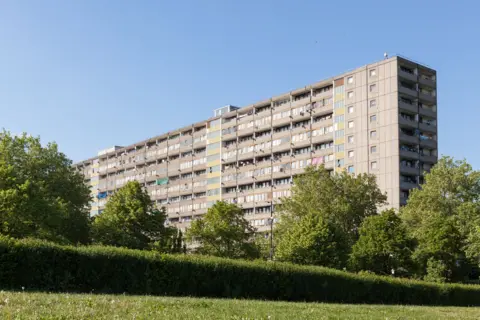 Getty Images
Getty Images
The Aylesbury Estate in Southwark, where Jovanni fell from the sixth floor of Missenden block

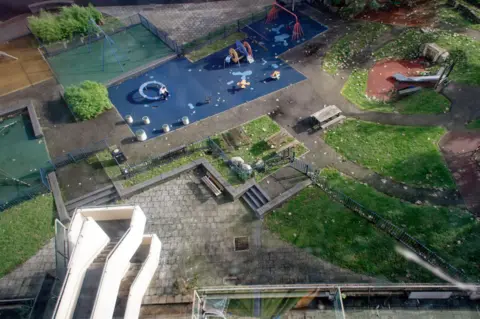 BBC /Laurence Cawley
BBC /Laurence Cawley
The view down from the sixth floor of Missenden
Jovanni lived on the Aylesbury Estate in Southwark, a complex completed in 1977 that exemplified both the ambitions and challenges of London's post-war social housing boom.
At its peak, it housed up to 11,000 people in over 2,700 flats across approximately 60 large buildings, connected by elevated walkways making it one of the largest of its kind in western Europe.
But the towers, once seen as the solution to urban overcrowding, have often become associated with safety concerns and social issues.
In 2005, former Conservative leader Michael Howard infamously dubbed the Aylesbury Estate "Hell's waiting room".
The estate has been slated for redevelopment since 2010, but progress has been slow.
The tragedy of Jovanni's death on that estate, is compounded by its seeming preventability.
Luanda explains that while there was a latch on the kitchen window, the one in Jovanni's bedroom "wasn't in a good state".
It's a common complaint among residents of ageing high-rises across London.
The government says local housing authorities must take enforcement action if they think a serious hazard - such as the potential for people falling between levels - exists.
Under the current legislation, tenants can take their landlords to court if their property is not fit for human habitation.
The government has told the BBC it is poised to tighten existing safety standards.
In a statement, the Ministry of Housing, Communities and Local Government said all of the deaths highlighted by the BBC were "absolutely tragic" adding: "Everyone has the right to a decent, safe home and landlords have a clear duty to ensure their properties are secure.
"We are taking action to strengthen safety, with a new Decent Homes Standard for the rented sectors to ensure safe, secure housing is the standard expected in social housing and private rented properties."

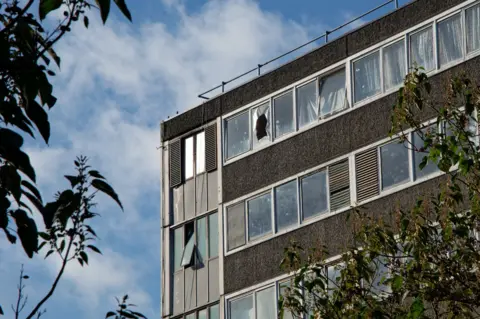 Laurence Cawley/BBC
Laurence Cawley/BBC
Concerns about safety persist to this day on the Aylesbury estate since the tragedy
The BBC returned to the Aylesbury Estate and found similar safety concerns persist for current residents and plenty of people who remember Jovanni.
Florence Bouachie has lived on the estate for 30 years and is on the fourth floor.
She said: "I'm concerned about my grandchildren and don't want them to go near [the windows] when I open the door.
"I'll make sure nobody go there, because the windows are not safe at all."

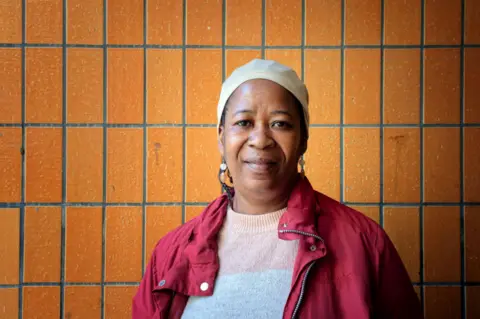 BBC /Laurence Cawley
BBC /Laurence Cawley
Florence Bouachie has lived on the Aylesbury Estate for 30 years
Retired hospital worker Alexander Olalla has lived on the estate since 1974.
Asked about the windows, he said: "They need the windows to lock properly, yeah? And they don't at the moment."
Southwark Council said: "We want everyone in Southwark to live in safe and decent homes and want to speak to anyone who has safety concerns about their housing.
"We will speak with people living in older homes on the Aylesbury estate about the issues raised."

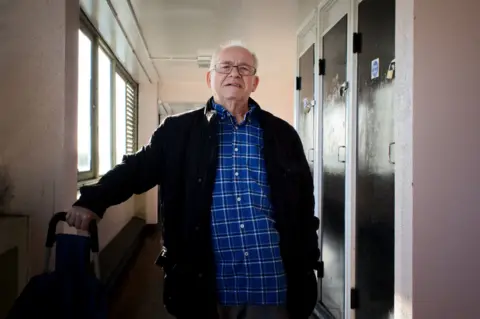 BBC /Laurence Cawley
BBC /Laurence Cawley
Residents like Alex remain worried about safety issues on the estate
'He was my ray of sunshine'

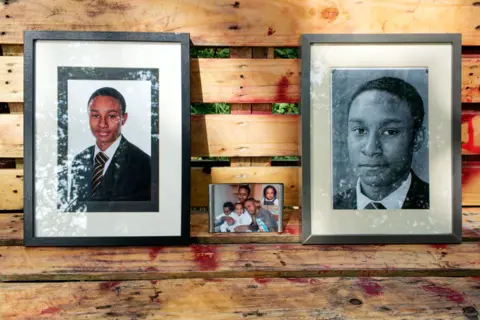 BBC/Laurence Cawley
BBC/Laurence Cawley
Jovanni's mum says each time she hears about a fall from a tower block, it reopens old wounds
For Luanda and countless other families these incidents are not just statistics.
"These aren't just 'inadequate properties', they're potential death traps.
"Every time I hear of another fall, I think, 'that could have been prevented'.
Luanda believes one solution is for landlords and councils to carry out regular stock checks on their properties.
"We really need to get out and do something, because one child is one too many," she added.

 2 months ago
13
2 months ago
13
